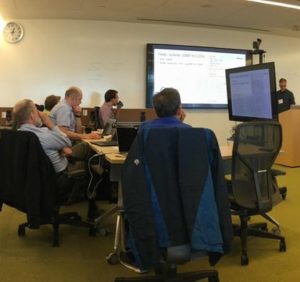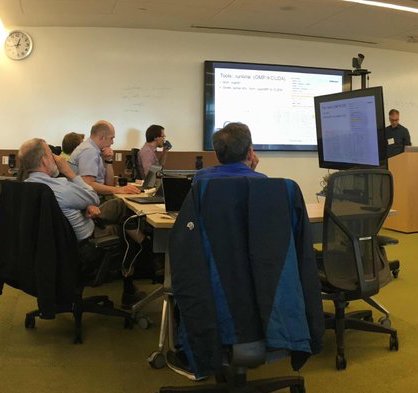
NERSC, Cray, NVIDIA Share GPU Expertise at First Hackathon for Future Perlmutter Users. Image: Rollin Thomas
NERSC recently hosted its first user hackathon to begin preparing key codes for the next-generation architecture of the Perlmutter system. Over four days, experts from NERSC, Cray, and NVIDIA worked with application code teams to help them gain new understanding of the performance characteristics of their applications and optimize their codes for the GPU processors in Perlmutter.
By starting this process early, the code teams will be well prepared for running on GPUs when NERSC deploys the Perlmutter system in 2020,” said Brian Friesen, an application performance specialist at NERSC who helped organize the event.
During the hackathon, the TOAST code team achieved a 30-40x speedup on a performance-critical kernel in their application – an impressive achievement in only four days.
Among those attending were several members of the ExaFEL project. The ExaFEL suite of codes analyzes data collected from biological samples in light sources such as the Linac Coherent Light Source at SLAC. As light sources become more powerful and generate data more quickly, the ExaFEL codes need to accelerate their performance as well in order to handle the high throughput of incoming data.
Members of the TOAST code team also participated. TOAST, which is being developed in Berkeley Lab’s Computational Cosmology Center, is used to process data collected from telescopes and detectors which probe the cosmic microwave background. Among other things, during the hackathon the TOAST code team achieved a 30-40x speedup on a performance-critical kernel in their application – “an impressive achievement in only four days,” Friesen noted.
All code teams made significant progress in extracting compute kernels in their codes, which comprise a large fraction of the code’s run time and are critical to accelerate,” he said. “Even if this task itself does not represent a speedup of the full application, it will nevertheless enable the code teams to develop high- performance GPU algorithms much more quickly, which can then be incorporated into their full applications more easily.”
NESAP code teams are selected to represent a significant fraction of the NERSC workload through a competitive process. Lessons learned from the hackathons will be communicated to the larger NERSC community through examples and tutorials on the NERSC web site and future seminars and training events
NERSC is planning additional NESAP hackathons, the next in conjunction with Oak Ridge National Laboratory July 15-19 in Oakland, Calif. NERSC’s Kevin Gott and Jack Deslippe are organizing that event.




